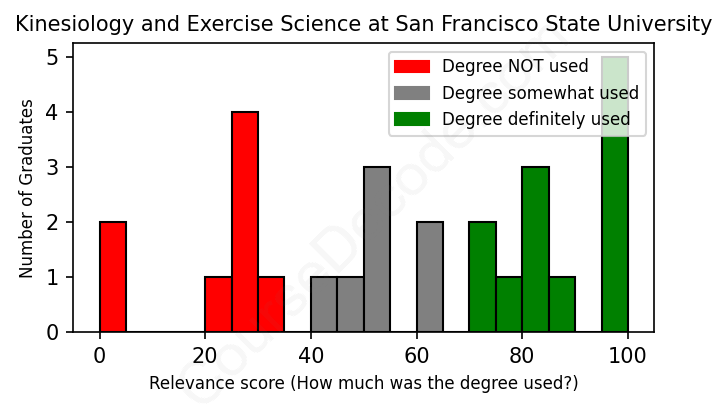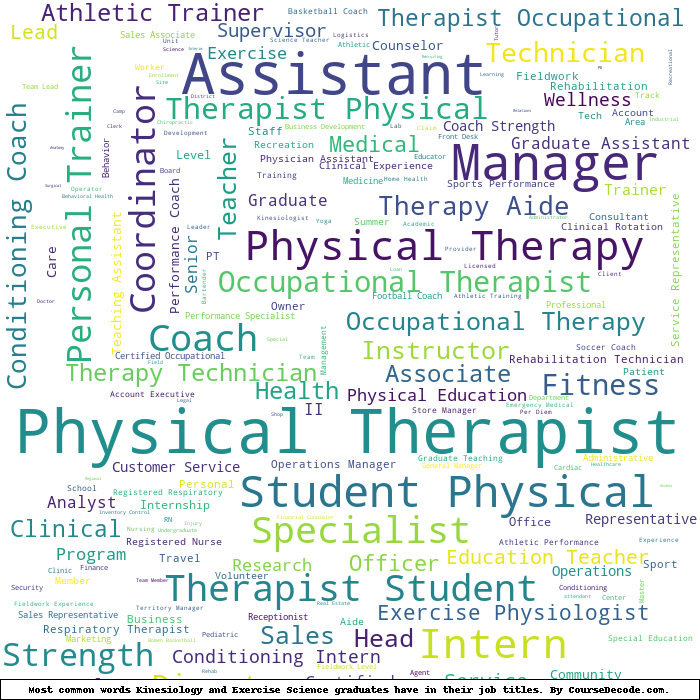
First, some facts. Of the Kinesiology and Exercise Science graduates from San Francisco State University we've analyzed , here's how many have used (or NOT used) their degree in their career:

These are estimates based on AI analysis of 27 LinkedIn profiles (see below).
The verdict? Below average. Overall, with an average relevance score of 58%, Kinesiology and Exercise Science graduates from San Francisco State University have a lower likelihood (-9%) of finding work in this field compared to the average graduate across all fields:
And for comparison, here's the chart for all profiles we've looked at across all degrees.
Also, after graduating, 44% of these graduates have pursued further education other than another Bachelor's degree (such as a Masters degree or other), compared to the average across all profiles of 35%. This suggests you may need more than just a Bachelors degree to be competitive as a Kinesiology and Exercise Science graduate.
See the details:
|
Relevance score: 78% We think this person has gone into a career highly relevant to their degree. We think this person has gone into a career highly relevant to their degree.
DEGREE INFOGraduated in 2020 from San Francisco State University with a Bachelor of Science - BS in Kinesiology and Exercise Science. No other secondary education since. JOB HISTORY SINCE GRADUATIONPhysical Education & Leadership Teacher San Francisco Unified School District Jul 2020 - Jun 2021 Program Leader  Booster Jun 2021 - Jun 2022 Client Manager  Booster Jun 2022 - Mar 2023 Owner  Copas Crew Fitness Mar 2023 - Present ABOUTNo information provided. |
The top 10 most common jobs done by the graduates we've analyzed (ranked most common to least) are:
When looking at the job trends for graduates from San Francisco State University who studied Kinesiology and Exercise Science, you can see a mix of paths people have taken. The most common jobs they have landed are in the fitness and rehabilitation fields, like personal trainers, physical therapy aides, and sports coaches. These roles typically rely heavily on the principles of kinesiology and exercise science, making them quite relevant to their studies. For instance, personal trainers at various gyms are consistently utilizing their knowledge about fitness, anatomy, and exercise prescriptions on a day-to-day basis, which shows a solid connection to their educational background.
However, it's worth noting that many graduates have also ventured into roles that don't directly utilize their kinesiology education, such as customer service representatives, office managers, and various administrative positions. These jobs tend to focus more on general skills rather than specialized knowledge in kinesiology or exercise science. So, while some grads are thriving in fitness and health-related careers, others are finding themselves using their degree in less relevant ways. Overall, it seems like there's a substantial amount of relevance for those in the fitness and healthcare fields, but quite a few have also strayed into careers that don't fully leverage their specialized knowledge.
Here is a visual representation of the most common words in job titles for Kinesiology and Exercise Science graduates (this is across all Kinesiology and Exercise Science graduates we've analyzed, not just those who went to San Francisco State University):

Graduates from San Francisco State University's Kinesiology and Exercise Science program seem to have a pretty wide range of career paths, especially right after they finish their degree. Many of them kick off their careers in entry-level roles directly related to physical therapy, personal training, or coaching, which makes sense given the focus of their studies. For example, you can see a lot of personal trainers and therapy aides popping up in their early job experiences. These positions align well with their academic training and often help them gain valuable hands-on experience in their field.
But the story gets a bit more mixed as they advance in their careers. While some stay rooted in fitness and therapy, moving up the ladder into roles like Supervisor or Director of Operations at training facilities, others drift into jobs that aren’t directly tied to their kinesiology background. You’ve got graduates who’ve taken on roles in education, customer service, and even technical fields like software engineering. If you’re hoping to stick close to the kinesiology and exercise science field, there are definitely paths available, especially within personal training and rehabilitation. However, it seems like many graduates also find themselves exploring a variety of unrelated job opportunities five to ten years down the line. Overall, the initial jobs look promising, but the long-term picture reveals a more varied career trajectory that could lead you anywhere, depending on your interests and ambitions.
Honestly, getting a Bachelor’s degree in Kinesiology and Exercise Science can be a mixed bag, and it depends a lot on your interests and background. At San Francisco State University, or really anywhere, it’s generally not considered super hard compared to some other degrees like engineering or physics, but it definitely has its challenges. You’ll dive into subjects like anatomy, exercise physiology, and biomechanics, which can be pretty heavy on the science side, especially if math isn’t your strong suit. If you’re passionate about fitness and health, you might find the material more engaging and easier to grasp. Overall, I'd say it’s a manageable degree, but like any college program, it requires commitment and hard work!
Most commonly, in the LinkedIn profiles we've looked at, it takes people 5 years to finish a Bachelor degree in Kinesiology and Exercise Science.
Looking at the job paths for these Kinesiology and Exercise Science grads from San Francisco State University, it's a bit of a mixed bag when it comes to making decent money. While some have secured roles that definitely have the potential for good pay, like personal trainers or in education, others are in more entry-level positions, like aides and coordinators, which typically don’t come with high salaries. For instance, many of the earlier graduates started off in roles like Occupational Therapy Aide or Physical Therapy Aide, which don't tend to pay well right off the bat. However, as we see them progress in their careers, particularly with personal training roles and leadership positions in fitness or education, there's a chance they could be pulling in some solid income down the line. Overall, it seems like some of them could make decent money if they stick with it and leverage their experience, but many start off slow with lower-paying jobs.
Here is a visual representation of the most common words seen in the "about" section of LinkedIn profiles who have a Bachelor degree in Kinesiology and Exercise Science (this is across all Kinesiology and Exercise Science graduates we've analyzed, not just those who went to San Francisco State University). This may or may not be useful:

Here are all colleges offering a Bachelor degree in Kinesiology and Exercise Science (ordered by the average relevance score of their Kinesiology and Exercise Science graduates, best to worst) where we have analyzed at least 10 of their graduates: